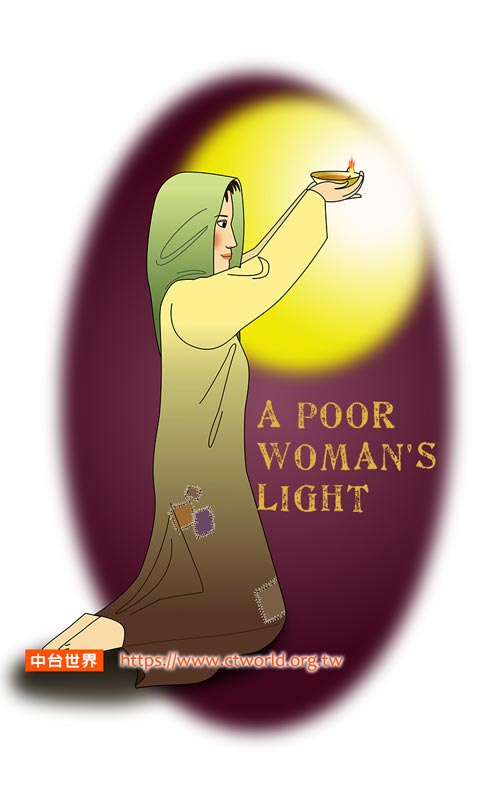
During the Buddha's time there was a poor woman named Nantuo living in the city of Shravasti. She was a beggar, possessing only the clothes on her back. One fiercely cold winter, with the wind biting her weak and trembling hands, she begged an entire day for one small coin. With this coin, she could buy a morsel of food to pass the night.
Wandering the city with coin in hand, she saw its residents eagerly purchasing exquisite perfumes, oils, and candles. There was to be a light offering to the Buddha that day. Nantuo couldn’t help but feel elated when she heard the news—the wish to offer a light spontaneously arose in her heart. “The Buddha’s appearance is a rare and precious occasion. I should take the chance to make an offering. But because I did not cultivate merits in my past lives, I am poor and miserable. What do I have to offer?” she thought.
Nantuo looked at the single coin in her hand. With nothing to eat, she would have to spend another night in hunger and cold. Nevertheless, her vow to offer a light in front of the Buddha remained resolute. With one coin, however, she could only afford the smallest amount of the crudest oil. But even the shopkeeper could see her sincerity; deeply moved, he gave her several times what she paid for.
As night fell on Shravasti, the entire city illuminated their lamps for the Buddha with sincerity in their hearts. The lamps shone like a river of light. The penniless Nantuo was in the midst of the crowd when she lit her lamp. Its light began to shine and she was filled with inexpressible joy. She reflected on her own life, full of destitution and suffering, and thought about all the sentient beings lost in the endless darkness of samsara. From the depths of her heart, she made a vow: “I vow that this light will reach the worlds of the ten directions and guide all sentient beings to the path of everlasting peace.”
With dawn came a miracle. All the lamps had gone out, no matter what precious oils they were filled with. Only Nantuo’s continued to burn. Even Elder Maudgalyayana, who was in charge of watching the lamps, could not extinguish it with his supernatural powers. He was astonished, “Whose lamp is this still burning? Even with my powers, I cannot put it out!”
The Buddha, who was present, pointed to Nantuo’s lamp and said, “Maudgalyayana, the one who offered this lamp made a great vow to save all sentient beings. Even with all the waters from the four great oceans, you would not be able to put it out. This candle burns with a great, compassionate vow. Because her heart was sincere, the light shining from this lamp is inexhaustible.”
Just then, Nantuo came to pay respects to the Buddha. The enlightened one received her and said, “Twenty kalpas from now, you will become a buddha who guides numberless sentient beings to liberation. You will be known as Lamplight Buddha.” Tears of gratitude fell down her face as Nantuo knelt in front of the Buddha and requested permission to enter the monastic life. After becoming a nun, she dedicated herself to practicing the Way and was deeply respected for her diligence and moral conduct.
REFLECTION
The significance of charitable giving goes beyond the monetary worth of what is given: it is also determined by the intention of the giver. Nantuo’s story proves even through our greatest trials, we still have the opportunity to practice giving with a genuine heart and the compassionate vow to benefit others. By doing so, we plant a karmic seed that ripens as inexhaustible blessings for all sentient beings. In the spirit of charity, with respect for all beings, we can light an everlasting lamp, a light of wisdom shining in the darkness of samsara.